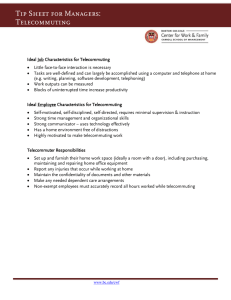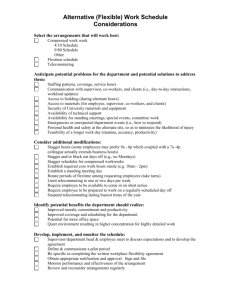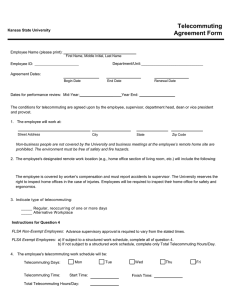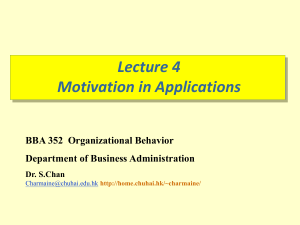NUMBER: HR 1.22 (NEW) SECTION:
advertisement
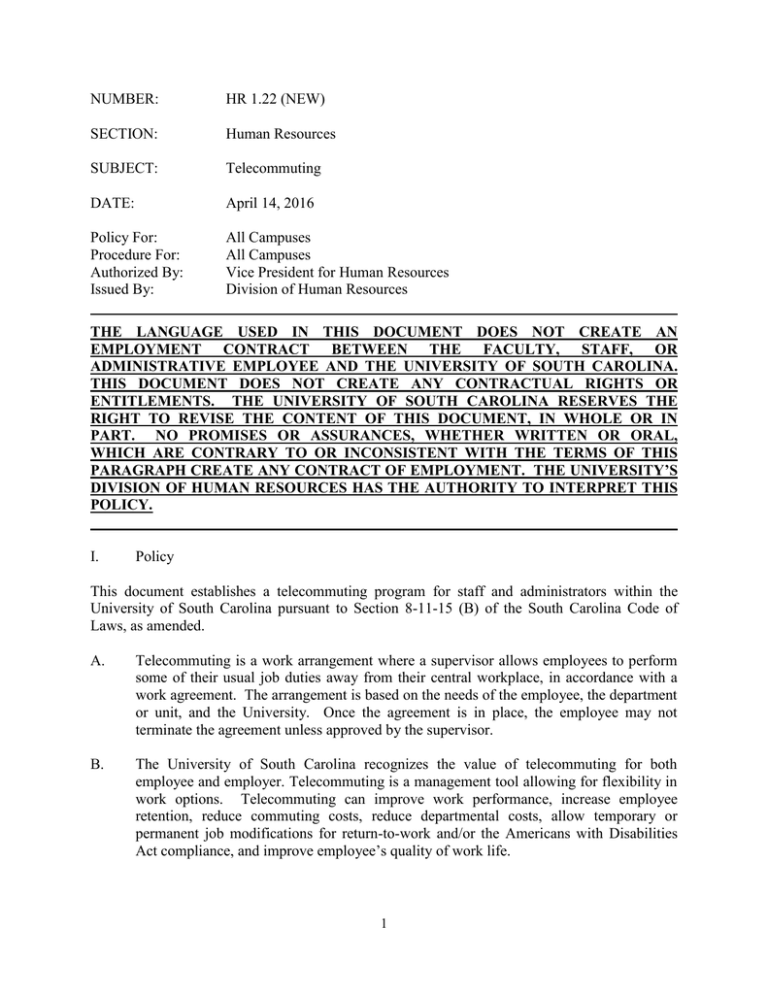
NUMBER: HR 1.22 (NEW) SECTION: Human Resources SUBJECT: Telecommuting DATE: April 14, 2016 Policy For: Procedure For: Authorized By: Issued By: All Campuses All Campuses Vice President for Human Resources Division of Human Resources THE LANGUAGE USED IN THIS DOCUMENT DOES NOT CREATE AN EMPLOYMENT CONTRACT BETWEEN THE FACULTY, STAFF, OR ADMINISTRATIVE EMPLOYEE AND THE UNIVERSITY OF SOUTH CAROLINA. THIS DOCUMENT DOES NOT CREATE ANY CONTRACTUAL RIGHTS OR ENTITLEMENTS. THE UNIVERSITY OF SOUTH CAROLINA RESERVES THE RIGHT TO REVISE THE CONTENT OF THIS DOCUMENT, IN WHOLE OR IN PART. NO PROMISES OR ASSURANCES, WHETHER WRITTEN OR ORAL, WHICH ARE CONTRARY TO OR INCONSISTENT WITH THE TERMS OF THIS PARAGRAPH CREATE ANY CONTRACT OF EMPLOYMENT. THE UNIVERSITY’S DIVISION OF HUMAN RESOURCES HAS THE AUTHORITY TO INTERPRET THIS POLICY. I. Policy This document establishes a telecommuting program for staff and administrators within the University of South Carolina pursuant to Section 8-11-15 (B) of the South Carolina Code of Laws, as amended. A. Telecommuting is a work arrangement where a supervisor allows employees to perform some of their usual job duties away from their central workplace, in accordance with a work agreement. The arrangement is based on the needs of the employee, the department or unit, and the University. Once the agreement is in place, the employee may not terminate the agreement unless approved by the supervisor. B. The University of South Carolina recognizes the value of telecommuting for both employee and employer. Telecommuting is a management tool allowing for flexibility in work options. Telecommuting can improve work performance, increase employee retention, reduce commuting costs, reduce departmental costs, allow temporary or permanent job modifications for return-to-work and/or the Americans with Disabilities Act compliance, and improve employee’s quality of work life. 1 C. Telecommuting may be a part-time or a full-time arrangement. It may involve the use of telecommunications (cellular phones, faxes, calling cards, internet access, pagers, etc.) or computer technologies. D. For formal telecommuting arrangements, the primary work location is the University of South Carolina office location to which the employee is assigned. The offsite work location is the employee’s telecommuting work address. In some limited cases, as designated as a condition of employment, the primary work location may be offsite with the alternative work location a USC office location to which the employee is assigned. E. Telecommuting arrangements for short-term projects of less than 3 months, brief illnesses, or an emergency situation do not require a formal telecommuting agreement unless the employee will have access to networks and other protected information through a University or a personal device. F. Telecommuting does not change the basic terms and conditions of employment. It is a management option and not a universal employee benefit or right. II. Procedures A. Employee Eligibility and Selection/Approval Criteria 1. To be eligible for telecommuting, an existing employee must have completed six months of satisfactory employment with the University. This six-month requirement may be waived at the discretion of the President or his designee. Employees in a warning notice of substandard performance are not eligible for telecommuting. 2. Initiation of a telecommuting arrangement can be at the request of either the University or the employee. If requested by the employee, a Telecommuting Request form should be submitted for review and approval by the appropriate authority before telecommuting may begin. If the telecommuting arrangement is initiated by the supervisor, only the Safety and IT Security sections of the Telecommuting Request form need to be completed and must be reviewed before the telecommuting may begin. If telecommuting is a condition of employment, the employee will be notified at the time of hire. 3. The Supervisor, Department Chair, or Dean/Director will review the Telecommuting Request form (if requested by the employee) for approval, considering the following factors: a. b. c. Needs of the department/unit and the employee; Employee's work duties and the ability to measure or assess work performed; Availability and costs of needed equipment; 2 d. e. f. g. h. B. Employee's current and past job performance, as documented in performance evaluations, including time management, organizational skills, self-motivation, and the ability to work independently; Assessment of other employees in the immediate work unit performing similar responsibilities to determine interest; Effect on service and the remaining employees of the unit or department; Measurable objectives and results mutually agreed to by the employee and the supervisor; and Other items deemed necessary and appropriate. 4. If approved, the employee and supervisor will complete a Telecommuting Agreement prior to the employee beginning the telecommuting program. 5. Copies of these documents are to be kept in the department and sent to the Division of HR to be placed in the employee’s permanent HR file. The Telecommuting Agreement should be reviewed and updated as conditions change but at minimum will be reviewed annually. 6. The University’s decision whether to grant a request to telecommute is final. 7. The Division of Human Resources may grant exceptions to portions of this policy. Departments should contact Employee Relations to request such exceptions. Conditions of Employment 1. The employee’s duties, responsibilities, and conditions of employment remain the same as if the employee were working at the employee’s USC office work location. The employee will continue to comply with all Federal laws, State laws, and University policies and procedures while working at the offsite work location. 2. Telecommuting will not adversely affect an employee’s eligibility for advancement or any other employee right or benefit. 3. The employee will be compensated for all time worked to include overtime, if applicable, leave, and travel. Travel between the University and the employee’s offsite location are not reimbursable travel expenses. Travel is a reimbursable expense when the primary work location is offsite (as a condition of employment) with the alternative work location as a USC office to which the employee is assigned. Required work hours, compensatory time, performance evaluations, and leave benefits will not change as a result of telecommuting. 4. Requests to work overtime, accrual of compensatory time, or use sick, annual, or other leave must be approved in the same manner as when the employee works at the primary work location and will be subject to the same rules and regulations. 3 C. 5. The actual work schedule of the telecommuting employee will be determined by the Supervisor, Department Chair and/or Dean/Director and will be documented in the Telecommuting Agreement. The University must be able to contact the employee by telephone and email during the scheduled work hours. 6. Regular communication through weekly or monthly meetings, teleconferencing, or in-office days is required. The employee may be directed to report to the USC office work location on a scheduled or an as-needed basis. The interval and the means by which the telecommuting employee should check-in with their supervisor should be documented in the telecommuting agreement (i.e. face-toface meetings, deliverables, status report on a weekly/monthly basis). 7. A supervisor may require a test period of up to 6 months to evaluate the success of the telecommuting arrangement. 8. The telecommuting agreement does not continue when the employee moves to a different job unless arrangements have been made to allow telecommuting in the new position. Designating the Offsite Work Space 1. The employee must agree to designate a separate workspace in the remote site for the purposes of telecommuting and maintain this area in a safe condition, free from hazards and other dangers to the employee, the University’s equipment, and confidential information. 2. To ensure the safety of the work space, the employee agrees to complete the Safety Checklist prior to the employee beginning the telecommuting program. It is the employee’s obligation to ensure the safety of the offsite work space and compliance with all health, safety, and confidentiality requirements. 3. The employee agrees that the University shall have reasonable access to the designated offsite work space for all reasonable purposes, including but not limited to inspection of the space, supervision of the employee, and retrieval of University-owned property and information. 4. No employee engaged in telecommuting will be allowed to conduct face-to-face, University-related business with non-University personnel at the offsite work location, except for those employees with a primary work location designated as offsite as a condition of employment. The employee will be liable for injuries or damages in the offsite work location to the person or property of third parties or any members of the employee’s family, and agrees to indemnify the University for any such claims. 4 D. 5. The employee understands that the University will not reimburse the cost of designated work space expenses, including but not limited to heat, water, electricity, –insurance, and telecommunications equipment and services. 6. Employees who live in rented property should review their rental lease to ensure that the lease permits business use of the premises. 7. The University reserves the right to inspect the designated offsite workspace to investigate whether all requirements are met. Workers’ Compensation The offsite work space, as approved, is considered an extension of the employee’s USC office work location; therefore, workers’ compensation will continue to exist for the employee when performing official work duties in the defined, offsite work space during approved telecommuting hours. Any work-related injuries must be reported to the employee’s supervisor immediately, and the employee must complete all necessary or management requested documents regarding the injury. E. Equipment Information The University may provide all or part of the equipment necessary for accomplishing work assignments, as determined by the appropriate authority. However, where agreements specify, employees may be authorized to use their own equipment. Telecommuting employees must abide by the University's policies concerning information security, software licensing and data privacy. All official University records, files, and documents must be protected from unauthorized disclosure or damage and returned safely to the USC office work location whenever requested by the University. The employee agrees to abide by any University rules concerning computer equipment (including protecting personal computers against “viruses”), agrees to follow University procedures for network access and to take all necessary steps to protect the integrity of the systems. Specific guidance regarding security for remote access is provided at: http://sc.edu/about/offices_and_divisions/university_technology_services/security/docs/s ecure_remote_access_guidance.pdf. 1. State-Owned Equipment and Documents a. The University established security controls and conditions for use of the State-owned equipment for the USC office location will also apply to the offsite work location. b. Data must be backed up to the University network on a regular basis as noted in the telecommuting agreement to ensure the University has records 5 particularly as required for state and federal grants and record keeping requirements. 2. F. c. Telecommuting employees must abide by University Purchasing and Accounting policies for all purchases and expenditures incurred for telecommuting equipment or services. The Telecommuting Agreement will be required as documentation for purchases and expenditures related to telecommuting and must be attached to all transactions. d. Support, maintenance, and repair of University-owned equipment will be performed only by a University authorized technician. The employee will be responsible for notifying the supervisor and bringing the equipment to the employer-designated repair location. Necessary maintenance and repairs on University-owned equipment will be performed at the University's expense. The telecommuting arrangement may be suspended/modified until functioning equipment is in place. e. The employee will return all University equipment, files, documents, and supplies to the University immediately upon termination of telecommuting or of the employee’s employment. Employee-Owned Equipment a. When employees are authorized to use their own equipment, the University will not assume responsibility for the cost of repair, maintenance, or service even if the employee is engaged in University work at the time of malfunction. The purchase of software and installation and configuration on employee-owned equipment are the responsibility of the telecommuter. The employee must make repairs or arrangements for repairs as quickly as possible and the telecommuting arrangement may be suspended/modified until functioning equipment is in place. b. Telecommuters using their own equipment must use the same security controls and protect data privacy. Termination of Participation 1. The University may terminate the telecommuting arrangement at any time with or without cause. This termination is final in terms of administrative review. The employee may request that the arrangement be terminated but it is at the University’s discretion to end the arrangement. 2. The University will give two weeks’ notice of termination, if possible. 6

